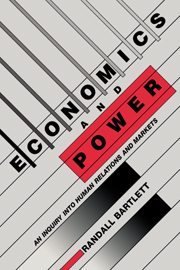Book contents
7 - Power in the employment relation
Published online by Cambridge University Press: 18 September 2009
Summary
For his book Working, Studs Terkel interviewed scores of people about their activities “at work.” Virtually all worked for someone else. Virtually all felt that someone had “power” over them. The dissatisfaction of having a “powerful boss” seemed a common factor in the oft expressed discontent of employees at all levels. They all perceived real power in the employment relation.
In the previous chapter power arose from principals' imperfect control over agents. It was power exercised by agents with principals and superior agents as subjects. Yet the workers in Terkel's book felt themselves to be the subjects of power, not its possessors. It is the potential for power in the employment relation that needs attention now.
The employment relation
There is substantial disagreement among economists over the role of power in employment relations. Standard textbook theory sees nothing distinct in labor markets. Labor is simply another factor of production, allocated among uses via market forces. The fact that labor not only is owned by individuals but lies inextricably bound within their minds and bodies is simply irrelevant. There is nothing intrinsically different about buying labor or pig iron. Both are simply marketed factors of production.
Simon and others have argued, however, that there is a distinct power relation in employment.
- Type
- Chapter
- Information
- Economics and PowerAn Inquiry into Human Relations and Markets, pp. 121 - 140Publisher: Cambridge University PressPrint publication year: 1989



